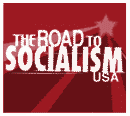by Joe Sims http://www.politicalaffairs.net/article/articleview/8033/
The crisis of the economy is at once a crisis in ideology. After 30 years of worship at the shrine of the free market, Reaganomics and other branches of conservative and neo-conservative thought seem bankrupt and thoroughly discredited if not dead – and not only right-wing schools. Deregulation, privatization, intense financial speculation on debt, the scaling back if not elimination of government social spending, in a word, “neo-liberalism” has reached its extreme limit almost bursting state-monopoly capitalism’s seams and triggering a worldwide financial meltdown.
Many causes have been attributed to the turmoil. Among the main contenders: “financialization” or the capitalism-on-crack of the bond markets and banks, a crisis of overproduction (too many goods chasing too few dollars), and a weak “real” economy due to insufficient allocation of surplus capital to productive investment. Some point to objective processes, others stress mistaken policy decisions. Clearly all were to one degree or another at play. Caution is in order, however. Objective economic processes, mistaken fiscal policies or even chance economic accidents, taken together or alone do not sufficiently explain the impetus behind the ongoing calamity. Also at work was the pernicious influence of institutionalized racism. In fact racist lending practices may have triggered the global financial collapse.
Slouching Toward Collapse
The origins of how the unraveling began is to be found in capitalism’s attempt to resolve ongoing crises. In fact, the neo-liberal model itself arose in response to attempts in advanced capitalist countries to maintain profits and find new markets. Faced in the 1970s with a declining rate of profit, a fractured world economy divided into “socialist” and capitalist camps, structural and fiscal crises along with spiraling inflation, capitalism’s generals undertook a re-forging of economic policy in the form of a wholesale assault on the edifice of the New Deal. Keynesianism had run into wall – at least from the point of view of big capital – and policy was now modulated to fit the maximum profit categorical imperatives of the new period. International trade pacts were formed, unions were rolled backed or held in check and fiscal policy was loosened as a new “post-industrial” service-oriented economy emerged.
At the center of this process was a huge transfer of wealth to the super rich, accomplished by means of tax cuts and a huge leap in labor productivity, as the corporate class acquired an even greater share of the surplus. For a period, neo-liberal economic policy seemed to work, lending the appearance of stability with low unemployment, relative labor peace and mild inflation, causing some to wonder if capitalism had become crisis free.
|




No comments:
Post a Comment